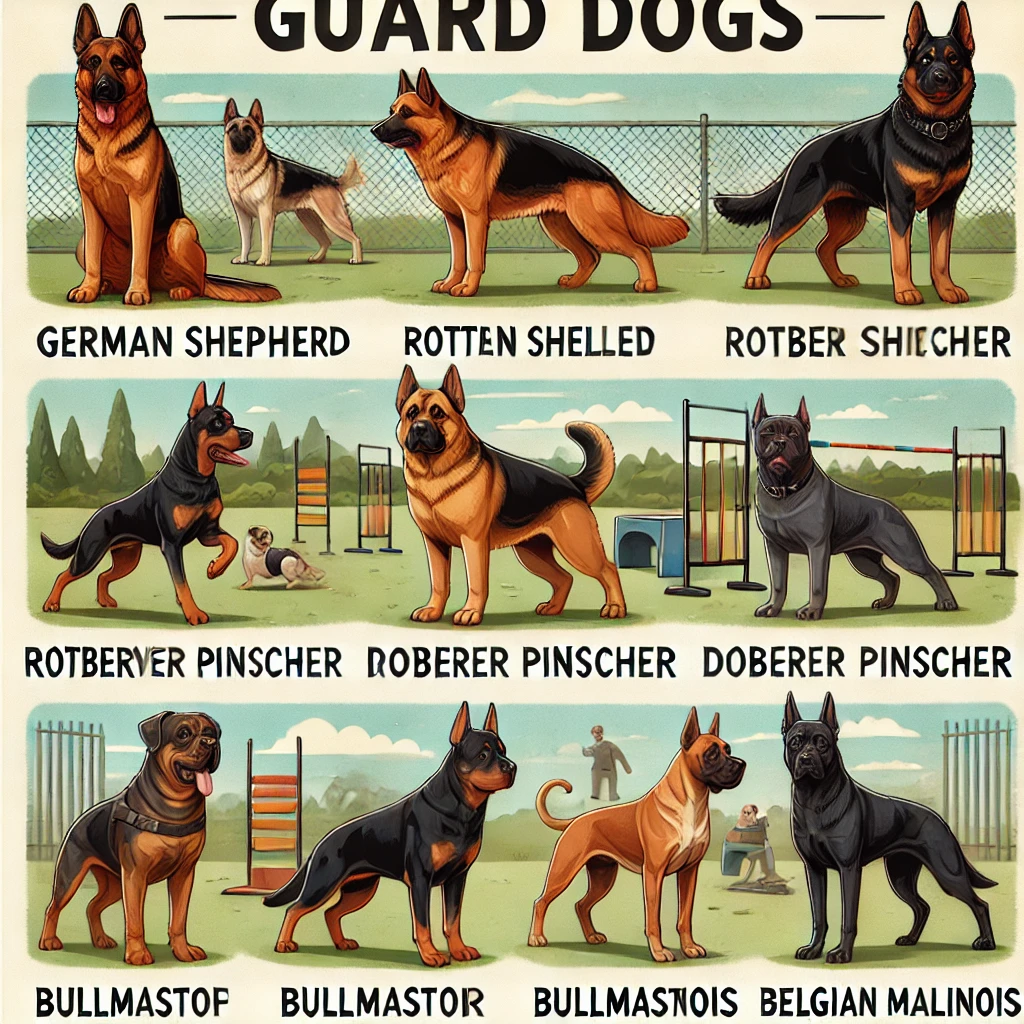Guard Dogs 101: Understanding Different Kinds
Guard dogs can be a great addition to your home, providing both security and companionship. However, choosing, training, and living with a guard dog involves careful consideration. This guide will help you understand the different types of guard dogs, how to train them, and what to expect when you bring one into your family.
Choosing the Right Breed for Your Needs
Choosing the right guard dog breed is super important. Different breeds offer unique benefits for guarding, but they all share key traits like loyalty, courage, and the ability to be trained for protective duties. These qualities help them fit into your family’s needs, whether it’s for security or just some extra cuddles.
Popular Guard Dog Breeds
When it comes to guard dogs, there are many breeds to consider. Some popular ones include:
- German Shepherds
- Rottweilers
- Doberman Pinschers
- Bullmastiffs
- Types of pitbulls
Each of these breeds has its own strengths and weaknesses, so it’s important to do your research.
Breed-Specific Traits
Different breeds have different traits. For example, Japanese dog breeds like the Akita are known for their loyalty and bravery. On the other hand, fluffy dog breeds like the Great Pyrenees are not only good guard dogs but also great with families. It’s crucial to understand these traits to make the best choice.
Matching Breed to Lifestyle
Your lifestyle plays a big role in choosing the right guard dog. If you have a busy life, you might want a breed that doesn’t require a lot of exercise. But if you love outdoor activities, a more active breed could be a better fit. Also, consider what dog breed has the most health problems, as this can affect your long-term commitment and expenses.
Remember, selecting a guard dog involves more than just picking a breed. You need to think about how the dog’s characteristics will fit with your lifestyle.
By considering these factors, you’ll be well on your way to finding the perfect guard dog for your needs.
Training Your Guard Dog
Training your guard dog is all about enhancing their natural protective instincts while ensuring they remain well-rounded and not overly aggressive. This includes teaching them to alert you to strangers or unusual occurrences and, in some cases, to respond defensively to a direct threat. Positive reinforcement dog training is key here, as it helps reinforce good behavior without encouraging unnecessary aggression.
Basic Training Tips
Start with general obedience training, which covers commands like sit, stay, and come. This is the foundation of everyday good behavior. Once your dog masters these, you can move on to more specialized commands. Remember, even the easiest puppies to train need consistency and patience.
Advanced Protection Training
Advanced training involves teaching your dog to recognize and respond to threats. This can include commands to bark on cue or to guard a specific area. It’s crucial to balance this with regular socialization to prevent your dog from becoming overly aggressive. If your dog is aggressive towards other dogs, seek professional help to address this issue.
Socialization Techniques
Socializing your guard dog is essential to ensure they can differentiate between normal and threatening situations. Introduce them to various environments, people, and other animals. This helps in calming a hyper dog and reduces the chances of them becoming overly suspicious or aggressive. A well-socialized dog is less likely to bark unnecessarily and more likely to be a reliable protector.
Training your guard dog is a journey that requires time, patience, and consistency. But with the right approach, you can have a loyal and protective companion who is also a beloved family member.
Living with a Guard Dog
Daily Care and Exercise
Taking care of a guard dog is a big responsibility. They need regular exercise to stay fit and happy. A daily walk or run is a must. Mental stimulation is just as important as physical activity. Puzzle toys and training sessions can keep their minds sharp. Don’t forget to check for any Bernese mountain dog health issues if you own one.
Balancing Protection and Family Life
It’s crucial to balance your dog’s protective instincts with family life. Socializing a puppy early on helps them understand who is a friend and who is a stranger. This makes them less likely to be aggressive towards family members or guests. Remember, a well-socialized dog is a happy dog.
Handling Behavioral Issues
Behavioral issues can pop up, even in the best-trained dogs. If you find yourself asking, “Why does my dog lick me so much?” it might be a sign of stress or anxiety. Addressing these issues early can prevent bigger problems down the line. Sometimes, consulting a vet or a professional trainer can make a world of difference.
Living with a guard dog means being prepared for both the joys and challenges. With the right care and training, your dog can be both a protector and a beloved family member.
Guard Dogs and Home Security
Effectiveness of Guard Dogs
Guard dogs can be a great addition to your home security. They can deter burglars who are afraid of dogs. However, it’s important to remember that a guard dog might not be enough on its own. You might still want a home security system to cover all your bases.
Guard Dogs vs. Security Systems
When comparing guard dogs to security systems, each has its pros and cons. A guard dog can provide a physical presence and alert you to danger, but a security system can offer 24/7 monitoring and immediate alerts to authorities. Here’s a quick comparison:
| Feature | Guard Dogs | Security Systems |
|---|---|---|
| Physical Deterrent | Yes | No |
| 24/7 Monitoring | No | Yes |
| Immediate Alerts | No | Yes |
| Maintenance | High | Low |
Legal Considerations
Before getting a guard dog, check your local laws. Some places have restrictions on certain breeds or require specific training. It’s also a good idea to look into insurance, as having a guard dog can affect your liability.
Remember, your dog’s safety and well-being are just as important as your own. Make sure you’re prepared for the responsibility that comes with owning a guard dog.
Common Myths About Guard Dogs

Myth: Guard Dogs Are Always Aggressive
A lot of people think that guard dogs have to be super mean and aggressive. This isn’t true at all. Many guard dogs are actually very friendly and calm when they’re not on duty. They can be great family pets and are often very gentle with kids.
Myth: Any Dog Can Be a Guard Dog
Not every dog is cut out to be a guard dog. Some breeds are naturally better at it than others. For example, a Chihuahua probably won’t scare off a burglar. It’s important to pick a breed that has the right traits for guarding.
Myth: Guard Dogs Don’t Need Socialization
Some folks believe that guard dogs don’t need to be socialized. This is a big mistake. Socialization helps your dog learn how to behave around people and other animals. Without it, your dog might become too aggressive or fearful.
Socializing your guard dog is just as important as training them to protect you. It helps them understand when to be protective and when to be friendly.
Guard Dogs for Families

Kid-Friendly Guard Dog Breeds
When it comes to protecting your family, some breeds stand out. These dogs are not only great at guarding but also gentle with kids. Breeds like German Shepherds, Bullmastiffs, and Rottweilers are often recommended by experts at the American Kennel Club. They are known for their loyalty and protective nature.
Training Guard Dogs Around Children
Training your guard dog to be around children is crucial. Start with basic commands and gradually introduce them to more complex tasks. Make sure to socialize your dog early on to prevent any aggressive behavior. Consistency is key, and always reward good behavior.
Safety Tips for Families with Guard Dogs
- Always supervise interactions between your dog and young children.
- Teach your kids how to approach and handle the dog properly.
- Make sure your dog has a dog health certificate to ensure they are in good health.
- Provide solutions for dog separation anxiety to keep your pet calm when you’re not around.
A well-trained guard dog can be a wonderful addition to your family, offering both protection and companionship.
Remember, the best family protection dogs are those that are well-trained and well-socialized. Choose a breed that fits your lifestyle and make sure to invest time in proper training and care.
Cost of Owning a Guard Dog
Initial Purchase and Training Costs
Getting a guard dog isn’t cheap. A well-trained guard dog can cost between $45,000 and $65,000. That’s like choosing between a new car or a top-notch security system. Some elite dogs, like Svalinn dogs, can even cost up to $150,000. This high price tag covers the extensive training these dogs undergo to ensure they can protect you and your family effectively.
Ongoing Expenses
Once you’ve got your guard dog, the spending doesn’t stop. You’ll need to budget for food, regular vet visits, and possibly special training sessions to keep your dog sharp. Here’s a quick breakdown:
| Expense Type | Estimated Annual Cost |
|---|---|
| Food | $1,200 – $2,400 |
| Vet Visits | $500 – $1,000 |
| Training Sessions | $1,000 – $2,000 |
Insurance and Liability
Owning a guard dog can also affect your insurance. Some insurance companies might charge higher premiums or even refuse coverage if you have a guard dog. It’s crucial to check with your insurance provider to understand how a guard dog might impact your policy.
Remember, owning a guard dog is a big responsibility. It’s not just about the money; it’s about ensuring the dog is well-cared for and properly trained to protect you and your loved ones.
Conclusion
So, there you have it! Guard dogs can be amazing protectors and loyal friends if you choose the right breed and give them proper training. Remember, it’s not just about picking a dog that looks tough. You need to think about how the dog’s personality fits with your family and lifestyle. With the right care and attention, your guard dog can be a loving pet and a reliable guardian. Happy dog hunting!
Key Takeaways
- Choosing the right breed is crucial for meeting your specific needs and lifestyle.
- Proper training, including basic obedience and advanced protection skills, is essential for a well-behaved guard dog.
- Living with a guard dog requires a balance between maintaining their protective instincts and ensuring they are family-friendly.
- Guard dogs can be an effective part of home security, but they should be considered alongside other security measures.
- There are many myths about guard dogs, such as the idea that they are always aggressive or that any dog can be a guard dog.
Frequently Asked Questions
What are the best breeds for guard dogs?
Some popular breeds for guard dogs include German Shepherds, Rottweilers, and Doberman Pinschers. These breeds are known for their loyalty, courage, and ability to be trained for protective duties.
Do guard dogs need special training?
Yes, guard dogs require specific training to ensure they can protect effectively without being overly aggressive. Basic obedience training is essential, followed by advanced protection training.
Can guard dogs be family pets?
Absolutely! With the right training and socialization, guard dogs can be loving family pets. It’s important to balance their protective instincts with proper socialization to ensure they are friendly with family members and guests.
Are guard dogs better than security systems?
Guard dogs offer benefits that security systems can’t, such as physical presence and the ability to respond to threats. However, combining both can provide the best security for your home.
What are the costs of owning a guard dog?
The costs include initial purchase and training, ongoing expenses like food and vet care, and potential insurance and liability costs. It’s important to consider all these factors before getting a guard dog.
Do guard dogs need socialization?
Yes, socialization is crucial for guard dogs. It helps them distinguish between normal and threatening situations, ensuring they don’t become overly aggressive or anxious around people and other animals.







